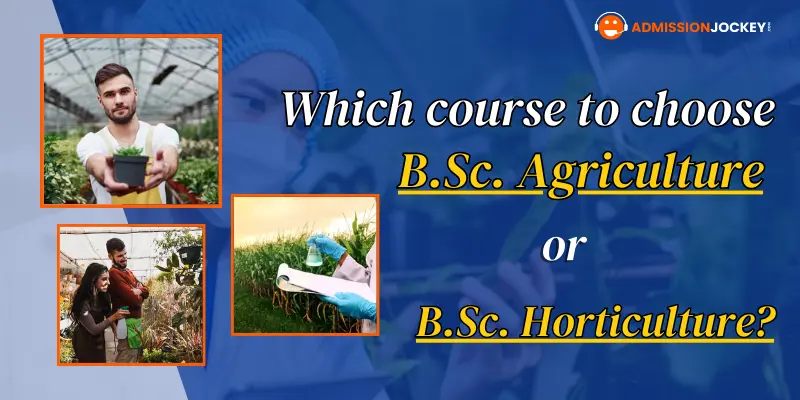B.Sc agriculture or B.Sc Horticulture
By admin | Last Updated Jun, 2023

Which course to choose B.Sc. agriculture or B.Sc. Horticulture?
The importance of technological understanding and creativity in the area of agriculture cannot be hidden in a world that heavily depends on agricultural practices in order to sustain the continuously expanding population. When it comes to selecting their academic career, students who have a passion for preserving nature’s diversity are left with a dilemma. Should they go away on an exploratory adventure through the B.Sc. Agriculture worlds or explore the fascinating field of B.Sc. Horticulture?
The advantages, job opportunities duties, incomes, and working sectors of B.Sc. Agriculture and B.Sc. Horticulture will be discussed in detail in this article.
B.Sc. Agriculture
B.Sc. Agriculture is a four-year undergraduate program that focuses on farming, food production, and all the techniques utilized for cultivation and irrigation. Students learn the fundamentals of growing a variety of crops as well as the latest methods for increasing soil fertility and food production. An agriculture advance works on the technical aspects of growing food and crops, caring for animals, managing water resources effectively, managing poultry, and other agricultural-related topics. This course opens the door to a wide range of opportunities for higher education.
B.Sc. Horticulture
The study of cultivating fruits, flowers, vegetables, tea, etc. is the focus of a B.Sc. in horticulture. Students study the theoretical and practical studies of crop plantation, and horticulture, after harvesting management, processing, and storage during the course. Only Indian universities and government agencies accept the BSc Horticulture degree. Although there are good professional opportunities, they are only available to cultivate fruits, vegetables, and other crops and the methods needed to develop them. If you want to learn how to grow vegetables, fruits, flowers, tea, etc. B.Sc. Horticulture is the best course for you.
B.Sc. Agriculture vs. B.Sc. Horticulture – Eligibility:
The minimum requirements for B.Sc. Agriculture and B.Sc. Horticulture courses are identical. There are, however, a few slight changes, which are covered below:
| B.Sc. Agriculture | B.Sc. Horticulture |
| To be eligible for admission to the B.Sc. agriculture, students must have completed the 12th from a recognized board with a minimum of 50% overall marks covering subjects like Physics, Chemistry, Biology, and Mathematics. | To be eligible for the exam, applicants must have 50% – 55% and they must have Physics, Biology, and Chemistry as compulsory subjects. |
| In order to apply for this course, candidates must be at least 17 years old. | In order to apply for this course, candidates must be between the ages of 17 and 25. |
Highlights:
| ASPECT | BSC AGRICULTURE | BSC HORTICULTURE |
| Definition | Crop production, soil science, animal management, and agricultural economics are all topics associated with the study of agriculture. | The study of cultivating, producing, and managing fruits, vegetables, flowers, and ornamental plants. |
| Course content | Soil science, genetics, plant pathology, agricultural engineering, animal science, and agricultural economics. | Plant science, horticultural engineering, plant breeding, plant propagation, and plant pest management. |
| Job opportunities | Agriculture companies, government agencies, farms, agribusinesses, research institutes, and educational institutions. | Landscaping companies, nurseries, garden centers, botanical gardens, farms, research institutions, and educational institutions. |
| Average Income | Rs.30,000- Rs.75,000 | Rs.25,000- Rs.70,000 |
| Required skills | Strong analytical skills, problem-solving ability, attention to detail, good communication skills, and physical stamina. | Good communication skills, creativity, attention to detail, problem-solving ability, and a passion for plants and gardening. |
Career options in B.Sc. Agriculture:

Career options in B.Sc. Horticulture:

Why to Pursue BSc Agriculture?
The following are some advantages of pursuing B.Sc. agriculture:
- India is an agricultural nation; therefore BSc Agriculture provides employment chances for qualified individuals that enhance the nation’s agricultural industry.
- Agronomists, agriculturists, plant breeders, entomologists, and other careers are available in both the government and private sectors.
- The BSc Agriculture course prepares students to learn about every element of agriculture and issues that are particular to it. They pursue careers to work in farming or the agricultural sector.
Why to Pursue BSc Horticulture?
Following are some advantages of pursuing B.Sc. Horticulture:
- Students who want to learn about specialized techniques and plant cultivation of plants such as vegetables, fruits, flowers, etc. might consider the BSc Horticulture course.
- Following the completion of a B.Sc. in horticulture, multiple career opportunities arise. A candidate may pursue careers as a pomologist, floriculturist, or horticultural.
- Candidates can get information about the plants utilized for aesthetic, medicinal, and dietary purposes.
Which is best- B.Sc. Agriculture vs. B.Sc. Horticulture?
Students with a B.Sc. in agriculture or horticulture have a variety of possibilities for further education. After completing their undergraduate degrees, students can apply to a variety of MBA or M.Sc. programs. But the details of which of the two is preferable are as follows:
- Demand: Over the past few years, there has been an upward trend in the number of qualified experts in agriculture. Due to technical advancements, agriculture has experienced the modernization revolution, and such specialized and knowledgeable researchers have developed. Potential horticulturists can find employment in horticulture-related businesses like fruit orchards, plantations, and vegetable farms.
- Career Development: Students studying a B.Sc. in Agriculture have the opportunity to work in administration, research, and development to enhance agricultural growth. If you’re a student who wants to work on making a difference in the horticulture industry and exhibits traits like attention to specifics, problem-solving skills, critical thinking, and effective communication, this course is ideal for you.
Conclusion:
The most important factors, in the end, will be your skill set, your ability to work in a particular line of work, and the college you select to study for your B.Sc. in Agriculture or Horticulture. A candidate who is more interested in farming and the growth of food crops could apply to a BSc agriculture program. On the other hand, B.Sc. Horticulture would be a wonderful choice if She/he is interested in a profession in the cultivation of specialized plants, such as fruit, flowers, tea, etc., and other plant that have medicinal or decorative qualities.

